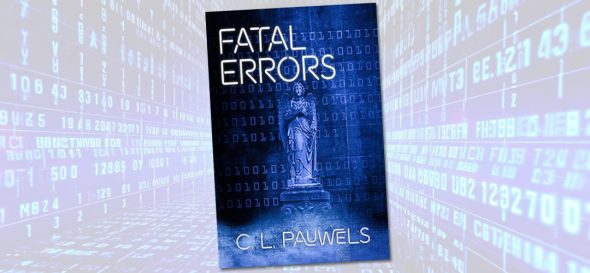
Local resident and writer Cyndi Pauwels recently released her fourth novel: “Fatal Errors,” a crime thriller and mystery. The novel was published in August by Crossroad Press and is available at all major online book retailers. (Submitted photo)
Village novelist debuts ‘Fatal Errors’
- Published: September 17, 2024
Local resident and writer Cyndi Pauwels — known to readers by her nom de plume, C.L. Pauwels — has a new book ready to grace shelves.
“Fatal Errors,” Pauwels’ fourth novel, was published in August by Crossroad Press. Its title is a kind of triple entendre: It contains a dual reference to its protagonist — named Fatál Wood, she’s a computer whiz and hacker who would be familiar with the “fatal error” warning that signals a software malfunction — and a nod to the dangerous plot that unfolds around her.
Pauwel’s new novel, presented as a crime thriller and mystery, follows a trilogy series that, as in “Fatal Errors,” is led by a strong, highly intelligent woman character. A big difference between the two leads, however, is their relationship to law enforcement: Pauwels’ trilogy follows a homicide detective, but 25-year-old Fatál Wood often operates outside of the law.
A “grey hat” hacker whose work necessitates a tendency to access networks and systems without permission — for ends that, while perhaps noble, are ethically and legally ambiguous in terms of means — Fatál finds herself in the throes of danger throughout “Fatal Errors.” After she suspects that the death of a loved one was not an accident, Fatál’s web-fueled investigation into that death lands her at odds with her probation officer — the result of being framed for a past crime — and with Homeland Security and her own family.
In speaking with the News last week, Pauwels said that, as with her previous trilogy of novels, she brought her own long career experience in the criminal justice field to her aid as she penned “Fatal Errors.” After a high school stint in the Police Explorer program, she worked as a police and fire dispatcher and, later, as a federal court deputy clerk in her home city, Toledo.
Bringing a sense of realism to the criminal aspects of “Fatal Errors” came more naturally, Pauwels said, than the computer- and hacking-based elements of the novel — but luckily, she had an expert close at hand.
“My husband’s the hacker — he’s my in-house guru,” Pauwels said.
“He teaches cyber-security and is a white hat hacker,” she added, noting that a “white hat” is hired to legally hack systems in order to test them for vulnerabilities, often having earned a Certified Ethical Hacker accreditation.
While Pauwels’ first trilogy was set in and around familiar Toledo, “Fatal Errors” stays closer to her Yellow Springs home — an approach the author said works for her style, which is more driven by character than setting.
“I always say that I don’t have the imagination for world-building,” Pauwels said. “People who write fantasy and create whole worlds out of nothing, I don’t know how they do that — that’s not me. I take a place I know and I try to stay as true to it as possible — unless I’m doing something a little off-color.”

Local resident and writer Cyndi Pauwels is known to readers by her nom de plume, C.L. Pauwels. (Submitted photo)
In this case, Pauwels referred to the fictional Gem City Business College, a central location in “Fatal Errors” where many of the novel’s more “off-color” events take place. But outside of this fictional school and a few other invented places, readers familiar with Dayton and Yellow Springs will have no trouble orienting Fatál within the world she occupies against familiar landmarks such as the Oregon District, the Little Art Theatre, Tom’s Market, the YS Arts Council — and even the Yellow Springs News.
Pauwels began writing “Fatal Errors” in 2011 as part of National Novel Writing Month, an annual November online event that challenges writers to begin and finish the first draft of a novel in 30 days. After that, she wrote in a recent blog post on her website, the manuscript “languished on [her] hard drive, gathering multiple tweaks, edits, rewrites, etc. over the years.”
She added that the novel’s central character essentially came to her already fully formed.
“Only another writer would understand this, maybe, but the voice in my head — that was Fatál, who woke me up one morning saying, ‘So I’m a hacker — get over it. Here’s my story,’” Pauwels said.
Another element of Fatál’s character that Pauwels said came to her whole-cloth? Her heritage: she’s the granddaughter of the vibrant Zigana, a Romani woman with a long connection to Roma culture and tradition.
“If she was going to be Roma, I needed to make it realistic,” Pauwels said. “I tried very hard to be sensitive to their culture, not make them stereotypical and not appropriate their life — but I also wondered, ‘Where can I give a realistic history of that?’”
She added: “I started looking around, and damned if it’s not in Dayton.”
Pauwels referred to Levi and Matilda Stanley, 19th-century Daytonites of Romani heritage who emigrated from England in 1856. The couple, part of a prominent Roma family, would come to be known as the “king and queen” of the Romani in North America until their deaths. The Stanleys, and many of their family, are buried in Dayton’s Woodland Cemetery; an altered image of Matilda Stanley’s grand, angel-like headstone constitutes the cover art for “Fatal Errors.”
A connection to history, as well as to real-world places, aims to lend a grounded sense of verisimilitude to Pauwels’ latest novel; readers familiar with the Miami Valley will also note the book’s references to the debates and conversations over fracking that took place in the village around the time “Fatal Errors” is set, as well as to conversations around the nebulous legality of Dayton cyber cafes, where illegal gambling sometimes did (and still does) take place.
Though crime and mystery are common elements in Pauwel’s writing, she said there’s another common thematic thread that stitches her work together: family.
“My characters often come from families that are not intact,” Pauwels said, and recalled a comment a family member made on her first novel, “40 & Out,” after reading it.
“He said, ‘That was pretty good, but you write like a girl,’” Pauwels said with a laugh. “I realized, after thinking about it for a while, it’s because of the family stuff — it’s because of the relationships. He was used to reading James Patterson and that ilk of suspense that tends not to get into family dynamics. I said, ‘Well, I’ll take it.’”
“Fatal Errors” continues along that thread, following Fatál as she navigates her relationship with both her estranged father and her grandmother, as well as her Romani heritage.
“I liked that I was able to set up that tension between [her grandmother] Zigana, this woman who raised her and is old-fashioned and doesn’t like computers, and Fatál, whose whole world is computers,” Pauwels said.
And that tension is alive within Fatál herself, too; though she regularly rails against the perceived mysticism often associated with Roma culture, she considers her decidedly nonmystical vocation of hacker as being aligned with that same culture. As Pauwels writes, from Fatál’s point of view:
“As Romani, we share a long history of justice denied, so we’ve learned to exact our own understated vengeance. Subtle, maybe delayed a bit, but karma needs a hand now and then, and I’m happy to oblige.”
Pauwels said she intends to bring Fatál Wood back in a second novel, which she’s currently writing — this time set 10 years forward, when the character is 35. In the years between beginning, and then finishing, “Fatal Errors,” and when she sat down to pen a sequel, however, Pauwels said the voice of its main character has, naturally, changed.
“She’s 10 years older, so it’s going to be a little different,” Pauwels said. “I want her to be the same person — just a little wiser from her experiences.”
“Fatal Errors” is available at all major online book retailers. For more information on Pauwels and her body of work, go to http://www.clpauwels.com.
The Yellow Springs News encourages respectful discussion of this article.
You must login to post a comment.
Don't have a login? Register for a free YSNews.com account.












No comments yet for this article.